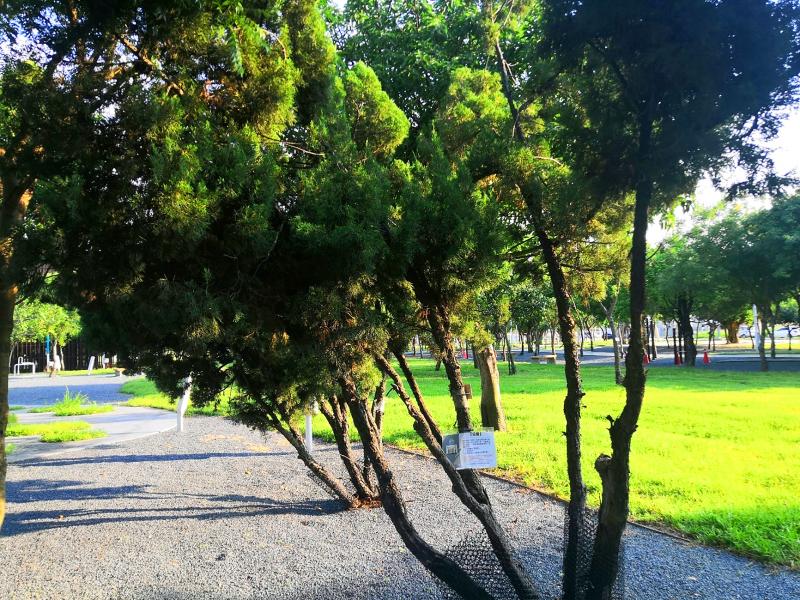The Ministry of Education must take action regarding possible medical concerns posed by inhalation of pollens or swallowing of organic materials produced by Chinese juniper trees, as the species can be found on many school campuses nationwide, the National Federation of Educational Unions said on Friday.
Federation president Lin Shuo-chieh (林碩杰) said that most schools lack awareness that cones, pollen and other irritants emitted by trees could cause discomfort to students and faculty.
Those under the trees of the Juniperus chinensis L. var. kaizuka variety could accidentally ingest the tiny cones as they drop, Lin said.

Photo courtesy of the National Federation of Educational Unions
People have reported problems from involuntarily swallowing or inhaling material produced by the trees, including severe coughing and temporary partial voice loss, he said.
The oxalic acid and calcium oxalate content in the cones could also cause a burning sensation or numbness in the lips, Lin said, adding that some people could also experience edema as a result of ingestion.
The body attempts to neutralize oxalic acid with calcium, which could cause those with calcium deficiencies to experience cramps, seizures, diarrhea or an irregular heart rate, Lin said.
More than 80 percent of accidental inhalations or ingestions of Chinese juniper cones are misdiagnosed as allergies, post-nasal drip symptoms, gastroesophageal reflux, Sjogren’s syndrome or lung cancer, he said.
Lin added that insurance policies do not cover medical expenses incurred when being treated for reactions caused by the trees.
The federation said that the ministry should determine how many schools have such trees on their grounds and take remedial action.
Students and faculty should also learn to recognize the trees and the potential hazards they pose, Lin said, adding that this would allow students and school faculty to know what caused their discomfort and minimize chances of misdiagnoses by doctors.

Costa Rica sent a group of intelligence officials to Taiwan for a short-term training program, the first time the Central American country has done so since the countries ended official diplomatic relations in 2007, a Costa Rican media outlet reported last week. Five officials from the Costa Rican Directorate of Intelligence and Security last month spent 23 days in Taipei undergoing a series of training sessions focused on national security, La Nacion reported on Friday, quoting unnamed sources. The Costa Rican government has not confirmed the report. The Chinese embassy in Costa Rica protested the news, saying in a statement issued the same

Taiwan’s Liu Ming-i, right, who also goes by the name Ray Liu, poses with a Chinese Taipei flag after winning the gold medal in the men’s physique 170cm competition at the International Fitness and Bodybuilding Federation Asian Championship in Ajman, United Arab Emirates, yesterday.

A year-long renovation of Taipei’s Bangka Park (艋舺公園) began yesterday, as city workers fenced off the site and cleared out belongings left by homeless residents who had been living there. Despite protests from displaced residents, a city official defended the government’s relocation efforts, saying transitional housing has been offered. The renovation of the park in Taipei’s Wanhua District (萬華), near Longshan Temple (龍山寺), began at 9am yesterday, as about 20 homeless people packed their belongings and left after being asked to move by city personnel. Among them was a 90-year-old woman surnamed Wang (王), who last week said that she had no plans

TO BE APPEALED: The environment ministry said coal reduction goals had to be reached within two months, which was against the principle of legitimate expectation The Taipei High Administrative Court on Thursday ruled in favor of the Taichung Environmental Protection Bureau in its administrative litigation against the Ministry of Environment for the rescission of a NT$18 million fine (US$609,570) imposed by the bureau on the Taichung Power Plant in 2019 for alleged excess coal power generation. The bureau in November 2019 revised what it said was a “slip of the pen” in the text of the operating permit granted to the plant — which is run by Taiwan Power Co (Taipower) — in October 2017. The permit originally read: “reduce coal use by 40 percent from Jan.